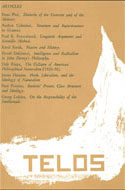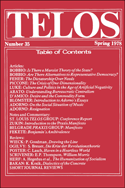By Matt Applegate · Thursday, March 13, 2014 As an occasional feature on TELOSscope, we highlight a past Telos article whose critical insights continue to illuminate our thinking and challenge our assumptions. Today, Matt Applegate looks at Paul Piccone’s “Students’ Protest, Class-Structure, and Ideology” from Telos 3 (Spring 1969).
 Paul Piccone’s 1969 essay “Students’ Protest, Class-Structure, and Ideology” captures the revolutionary ethos of that time in the United States. Hippies, student politics, Black Power, as well as the work of such figures as Régis Debray and Herbert Marcuse all come under Piccone’s earnest critical consideration. His primary concern, however, is the link between these student revolts and the state of education in the United States. On the one hand, Piccone is intent on charting the means by which hyper-industrialization and the technologization of work lead to open student rebellion. On the other, he is interested in understanding why student rebellion is effective in relation to other forms of revolutionary organization that appear alongside it. Paul Piccone’s 1969 essay “Students’ Protest, Class-Structure, and Ideology” captures the revolutionary ethos of that time in the United States. Hippies, student politics, Black Power, as well as the work of such figures as Régis Debray and Herbert Marcuse all come under Piccone’s earnest critical consideration. His primary concern, however, is the link between these student revolts and the state of education in the United States. On the one hand, Piccone is intent on charting the means by which hyper-industrialization and the technologization of work lead to open student rebellion. On the other, he is interested in understanding why student rebellion is effective in relation to other forms of revolutionary organization that appear alongside it.
Continue reading →
By Robert Wyllie · Tuesday, January 14, 2014 As an occasional feature on TELOSscope, we highlight a past Telos article whose critical insights continue to illuminate our thinking and challenge our assumptions. Today, Robert Wyllie looks at Norberto Bobbio’s “Is There a Marxist Theory of the State?” from Telos 35 (Spring 1978).
 Norberto Bobbio’s 1978 article “Is There a Marxist Theory of the State?” marks a turning point in the history of Telos. The “red decade” was coming to a close in the mid-1970s, and the New Left was falling into disarray. Hence, Bobbio writes an epitaph in this 1978 article, which makes the convincing case that the Left was never able to develop a political theory that included a positive concept of the political state. In the years following Bobbio’s article, the Telos group would begin to look elsewhere. As Paul Piccone and Gary Ulmen later explained, “Telos‘ initial interest in [Carl] Schmitt’s work was triggered in the 1980s by the realization, in the collapse of the New Left and under the influence of Norberto Bobbio’s criticism, that the Left in general and Marxism in particular had no political theory.”[1] Bobbio moved Telos away from “revolution, dialectic, commodity fetishism, liberation, alienation, and monopoly capitalism”[2] to Carl Schmitt, federalism, and populism. Norberto Bobbio’s 1978 article “Is There a Marxist Theory of the State?” marks a turning point in the history of Telos. The “red decade” was coming to a close in the mid-1970s, and the New Left was falling into disarray. Hence, Bobbio writes an epitaph in this 1978 article, which makes the convincing case that the Left was never able to develop a political theory that included a positive concept of the political state. In the years following Bobbio’s article, the Telos group would begin to look elsewhere. As Paul Piccone and Gary Ulmen later explained, “Telos‘ initial interest in [Carl] Schmitt’s work was triggered in the 1980s by the realization, in the collapse of the New Left and under the influence of Norberto Bobbio’s criticism, that the Left in general and Marxism in particular had no political theory.”[1] Bobbio moved Telos away from “revolution, dialectic, commodity fetishism, liberation, alienation, and monopoly capitalism”[2] to Carl Schmitt, federalism, and populism.
Continue reading →
|
|
 Paul Piccone’s 1969 essay “Students’ Protest, Class-Structure, and Ideology” captures the revolutionary ethos of that time in the United States. Hippies, student politics, Black Power, as well as the work of such figures as Régis Debray and Herbert Marcuse all come under Piccone’s earnest critical consideration. His primary concern, however, is the link between these student revolts and the state of education in the United States. On the one hand, Piccone is intent on charting the means by which hyper-industrialization and the technologization of work lead to open student rebellion. On the other, he is interested in understanding why student rebellion is effective in relation to other forms of revolutionary organization that appear alongside it.
Paul Piccone’s 1969 essay “Students’ Protest, Class-Structure, and Ideology” captures the revolutionary ethos of that time in the United States. Hippies, student politics, Black Power, as well as the work of such figures as Régis Debray and Herbert Marcuse all come under Piccone’s earnest critical consideration. His primary concern, however, is the link between these student revolts and the state of education in the United States. On the one hand, Piccone is intent on charting the means by which hyper-industrialization and the technologization of work lead to open student rebellion. On the other, he is interested in understanding why student rebellion is effective in relation to other forms of revolutionary organization that appear alongside it.  Norberto Bobbio’s 1978 article “Is There a Marxist Theory of the State?” marks a turning point in the history of Telos. The “red decade” was coming to a close in the mid-1970s, and the New Left was falling into disarray. Hence, Bobbio writes an epitaph in this 1978 article, which makes the convincing case that the Left was never able to develop a political theory that included a positive concept of the political state. In the years following Bobbio’s article, the Telos group would begin to look elsewhere. As Paul Piccone and Gary Ulmen later explained, “Telos‘ initial interest in [Carl] Schmitt’s work was triggered in the 1980s by the realization, in the collapse of the New Left and under the influence of Norberto Bobbio’s criticism, that the Left in general and Marxism in particular had no political theory.”[1] Bobbio moved Telos away from “revolution, dialectic, commodity fetishism, liberation, alienation, and monopoly capitalism”[2] to Carl Schmitt, federalism, and populism.
Norberto Bobbio’s 1978 article “Is There a Marxist Theory of the State?” marks a turning point in the history of Telos. The “red decade” was coming to a close in the mid-1970s, and the New Left was falling into disarray. Hence, Bobbio writes an epitaph in this 1978 article, which makes the convincing case that the Left was never able to develop a political theory that included a positive concept of the political state. In the years following Bobbio’s article, the Telos group would begin to look elsewhere. As Paul Piccone and Gary Ulmen later explained, “Telos‘ initial interest in [Carl] Schmitt’s work was triggered in the 1980s by the realization, in the collapse of the New Left and under the influence of Norberto Bobbio’s criticism, that the Left in general and Marxism in particular had no political theory.”[1] Bobbio moved Telos away from “revolution, dialectic, commodity fetishism, liberation, alienation, and monopoly capitalism”[2] to Carl Schmitt, federalism, and populism. 

